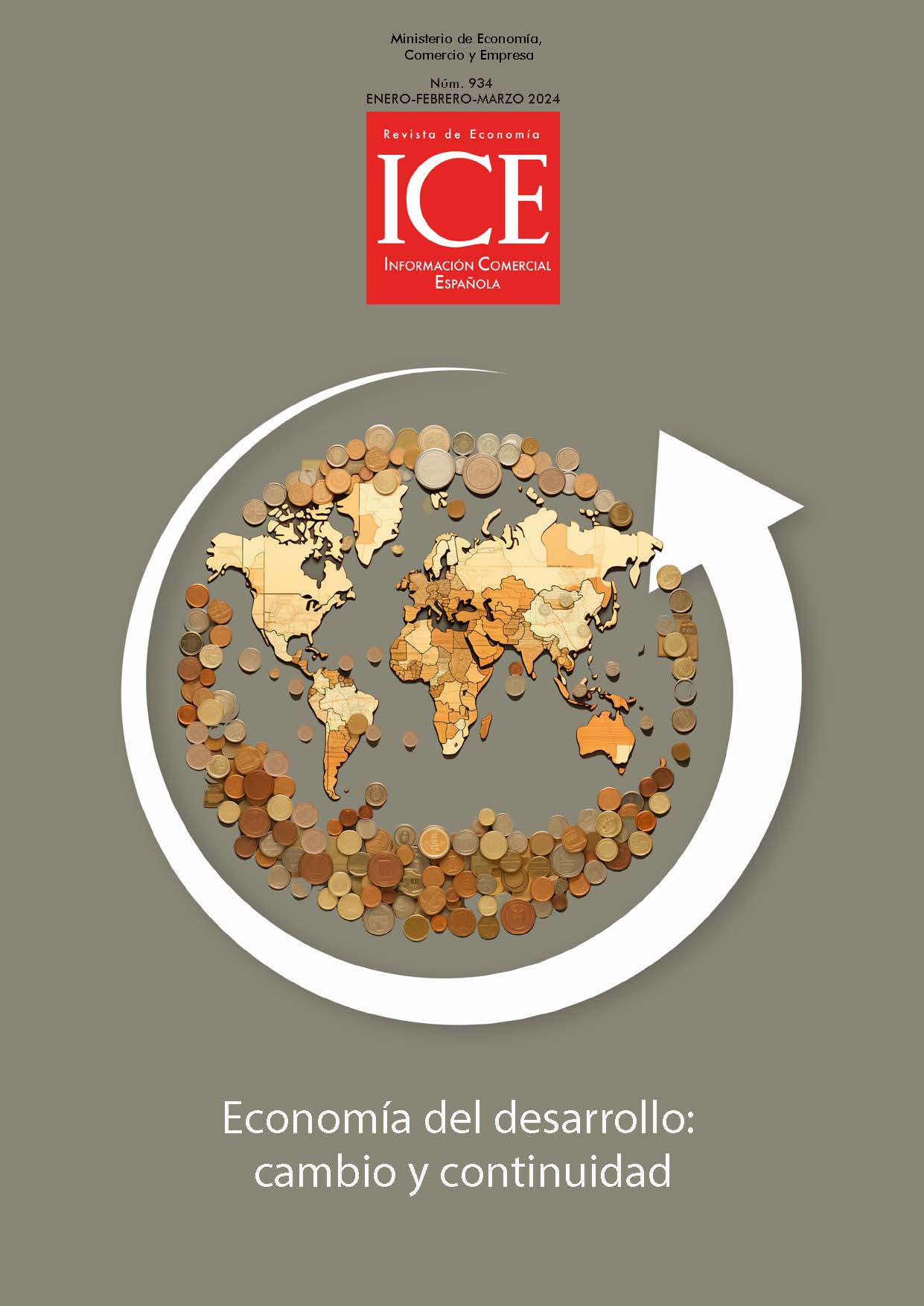Una perspectiva global de la sostenibilidad social y la pobreza
##plugins.themes.bootstrap3.article.sidebar##
Descargas
##plugins.themes.bootstrap3.article.main##
La sostenibilidad social es un concepto mal entendido y vagamente definido, a pesar de la creciente apreciación de su relevancia. Este artículo avanza en la comprensión empírica de la sostenibilidad social mediante la construcción de una base de datos global de 71 indicadores a través de 193 países y 37 territorios entre 2016 y 2020. Los indicadores se agrupan en cuatro dimensiones —inclusión social, resiliencia, cohesión social y legitimidad de los procesos— para las que construimos índices de medición. Un sencillo análisis empírico —basado en correlaciones y diagramas de dispersión— que utiliza nuestra base de datos confirma que la sostenibilidad social está negativa y fuertemente asociada a la pobreza (mientras que positivamente asociada con el ingreso per cápita).
##plugins.themes.bootstrap3.article.details##
Åhman, H. (2013). Social sustainability - society at the intersection of development and maintenance. Local Environment, 18(10), 1153-1166.
Ballet, J., Bazin, D., & Mahieu, F.-R. (2020). A Policy Framework for Social Sustainability: Social Cohesion, Equity and Safety. Sustainable Development, 28(5), 1388-1394.
Barron, P., Cord, L., Cuesta, J., Espinoza, S. A., Larson, G., & Woolcock, M. (2023). Social Sustainability in Development: Meeting the Challenges of the 21st Century. New Frontiers of Social Policy - World Bank Group.
Comisión Europea. (2021). Delivering the Green Deal: The Decisive Decade. https://data.europa.eu/doi/10.2775/352471
Cuesta, J., Cai, L., Madrigal, L., & Pecorari, N. (2023). Exposure to Climatic Risks and Social Sustainability in Vietnam. Sustainability, 15(4), 1-25.
Cuesta, J., Madrigal, L., & Pecorari, N. (2024). Social Sustainability, Poverty and Income: An Empirical Exploration. Journal of International Development. In press.
Dempsey, N., Bramley, G., Power, S., & Brown, C. (2011). The Social Dimension of Sustainable Development: Defining Urban Social Sustainability. Sustainable Development, 19(5), 289-300.
ICA. (2016). Sustainability Reporting for Co-operatives: A Guidebook. International Co-operative Alliance - Brussels.
Littig, B., & Griessler, E. (2005). Social sustainability: a catchword between political pragmatism and social theory. International Journal of Sustainable Development, 8(1-2), 65-79.
Maloutas, T. (2003). Promoting social sustainability: The case of Athens. City, 7(2), 167-181.
Mehan, A., & Soflaei, F. (2017). Social sustainability in urban context: Concepts, definitions, and principles. In M. Couceiro da Costa, F. Roseta, J. Pestana & S. Couceiro da Costa (Eds.), Architectural Research Addressing Societal Challenges, volume 1 (pp. 293-299). CRC Press - Taylor & Francis Group.
Pierson, J. (2002). Tackling Social Exclusion. Routledge.
Polèse, M., & Stren, R. (2000). The Social Sustainability of Cities: Diversity and the Management of Change. University of Toronto Press.
Purvis, B., Mao, Y., & Robinson, D. (2019). Three pillars of sustainability: in search of conceptual origins. Sustainability Science, 14(3), 681-695.
Ratcliffe, P. (2000). Is the assertion of minority identity compatible with the idea of a socially inclusive society? In P. Askonas & A. Stewart (Eds.), Social Inclusion: Possibilities and Tensions (pp. 169-185). Palgrave Macmillan.
The White House. (2021, June 12). FACT SHEET: President Biden and G7 Leaders Launch Build Back Better World (B3W) Partnership. [Statements and Releases]. https://www.whitehouse.gov/briefing-room/statements-releases/2021/06/12/fact-sheet-president-biden-and-g7-leaders-launch-build-back-better-world-b3w-partnership/
Turkington, R., & Sangster, K. (2006). From housing to social mix: housing’s contribution to social sustainability. Town and Country Planning, 75(6), 184-185.
UNRISD. (2016). Policy Innovations for Transformative Change: Implementing the 2030 Agenda for Sustainable Development. United Nations Research Institute for Social Development.
WEF & McKinsey Company. (2022). Resilience for Sustainable, Inclusive Growth: White Paper. World Economic Forum, Davos-Switzerland. https://www3.weforum.org/docs/WEF_Resilience%20for_Sustainable_Inclusive_Growth_2022.pdf
Weingaertner, C., & Moberg, Å. (2014). Exploring Social Sustainability: Learning from Perspectives on Urban Development and Companies and Products. Sustainable Development, 22(2), 122-133.
World Bank. (2005). Empowering People by Transforming Institutions: Social Development in World Bank Operations. Social Development Strategy Paper. Washington DC.
World Bank. (2021, April 9). From COVID-19 Crisis Response to Resilient Recovery - Saving Lives and Livelihoods while Supporting Green, Resilient and Inclusive Development (GRID) [Development Committee Meeting]. https://thedocs.worldbank.org/en/doc/9385bfef1c330ed6ed972dd9e70d0fb7-0200022021/original/DC2021-0004-Green-Resilient-final.pdf
World Bank. (2022). Social Sustainability Global Database 2022. Washington DC.


